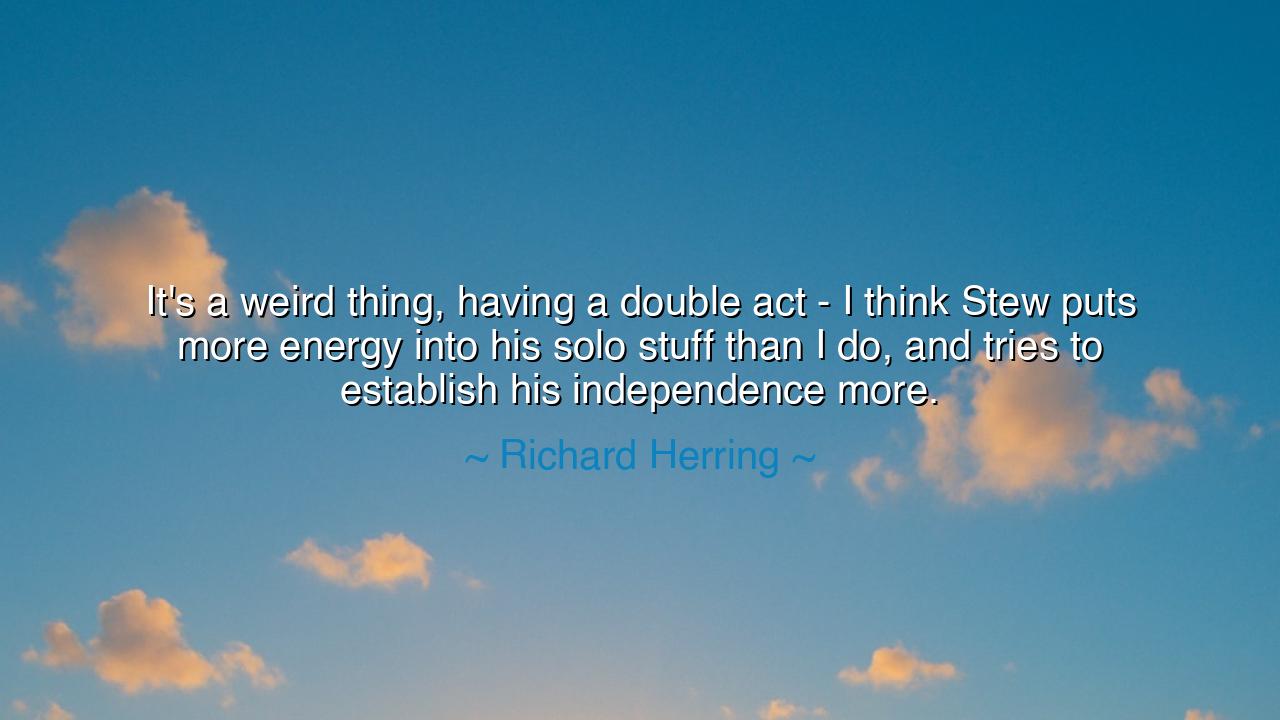
It's a weird thing, having a double act - I think Stew puts more
It's a weird thing, having a double act - I think Stew puts more energy into his solo stuff than I do, and tries to establish his independence more.






“It’s a weird thing, having a double act — I think Stew puts more energy into his solo stuff than I do, and tries to establish his independence more.” So spoke Richard Herring, one half of the celebrated British comedy duo Lee and Herring, reflecting upon the delicate art of partnership — that strange dance of unity and individuality that binds two souls in a shared purpose while pulling them ever toward their own horizons. In this confession lies a truth as old as creation itself: that every partnership, no matter how harmonious, carries within it the quiet struggle between togetherness and independence, between the shared flame and the yearning to burn alone.
The ancients understood this tension well. When they spoke of twins — of Castor and Pollux, of Romulus and Remus — they spoke not only of brotherhood, but of destiny’s dividing line. To be part of a double act is to share the stage of life with another, to rise and fall in step with someone else’s rhythm. There is joy in it, yes — for two minds may strike sparks that no single soul could conjure — but there is also the challenge of the self: the question of where you end and they begin. Herring’s words are the modern echo of this eternal paradox — a reminder that even in union, the spirit longs for its own space to grow.
In the world of art, and indeed in life, every partnership begins with balance. One complements the other, each giving what the other lacks. In the case of Herring and Stewart Lee, their humor was born of contrast — Herring’s boyish energy and daring wit countered by Lee’s sharp intellect and deliberate gravity. Together, they created something greater than themselves, a harmony of difference. Yet, as in all such unions, the day comes when each partner feels the pull of independence — the call to shape their own world, to define their own voice. It is not betrayal; it is the natural evolution of creativity, the flowering of two roots that once grew from the same seed.
Consider, if you will, the story of Lennon and McCartney, whose partnership gave birth to songs that reshaped music itself. Together, they were invincible — their talents intertwined in perfect tension. But as time passed, each longed to speak in his own voice. Lennon sought raw expression, McCartney melody and peace. When they parted, the world mourned, yet both continued to create, proving that separation does not destroy the bond — it transforms it. So too in Herring’s reflection, we hear not bitterness, but understanding — that Stew’s independence is not a rejection, but a continuation of their shared journey by another path.
What makes Herring’s words powerful is their humility. He does not speak of rivalry, but of difference — of how one may put more energy into the solo endeavor, while the other remains content within the shared creation. There is wisdom in this: for not all souls are called to the same kind of freedom. Some shine brightest in communion, others in solitude. Both ways are sacred. To know oneself — to understand where your spirit finds its truest expression — is the mark of wisdom. It is not weakness to find joy in partnership, nor pride to seek one’s own light. Each path demands courage.
The ancients would tell us that every double act, whether in art, love, or life, mirrors the dual nature of humanity itself — our need for connection and our need for selfhood. When we deny either, we wither. When we honor both, we thrive. Thus, Herring’s insight becomes a lesson not merely for performers, but for all who share their lives with others: do not fear the growth of those beside you, for their strength does not diminish yours. In truth, every act of independence enriches the bond, for it brings new wisdom, new strength, new perspective to what was once shared.
So let this teaching be remembered, O listener of the ages: whether you walk with a partner or stand alone, honor both the union and the self. Support those who seek their independence, and do not measure your worth by the energy of another. In every partnership, there will come a moment when one must take the stage alone — not as a rejection, but as a testament to the power of what was once shared. For in the end, as Herring’s reflection teaches us, harmony is not the stillness of sameness, but the living rhythm between unity and freedom — the eternal duet of human creation.






AAdministratorAdministrator
Welcome, honored guests. Please leave a comment, we will respond soon